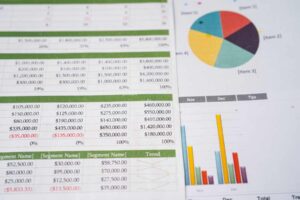Understanding the most frequently used words and phrases in the sharemarket will help you navigate your share investments more effectively. Below are some common terms and their definitions:
Ordinary Shares: Ordinary shares, commonly referred to simply as “shares,” give their holder part-ownership in a company. Holders of ordinary shares are entitled to voting rights and company dividends.
Index: An index is a benchmark used to measure the performance of the sharemarket or a component of the sharemarket. For example, in the Australian sharemarket, the ASX/S&P 200 represents the overall sharemarket.
Volatility: Volatility refers to the extent of price movement of a share or the sharemarket. High volatility means shares have extreme up-and-down movements in their prices and performance, making them more difficult to predict. Volatility is a common measure of the riskiness of a share or sharemarket.
Dividend Imputation: A tax rule whereby tax paid by a company is credited to individual shareholders. Shareholders are assessed on the total amount of the dividend and imputation credit, and then allowed to claim a tax rebate equal to the imputation credit. This eliminates the double taxation of company profits. If the franking credits you receive exceed the tax you must pay, you can claim the difference as a tax refund.
Dividend Yield: The yield, or income, from shares expressed as a percentage. Dividend yield is calculated by dividing a company’s total annual dividends by its share price.
Franked Dividends: An Australian company may pay you a franked dividend, which is paid out of company income that has already been taxed. Shareholders receive a reduction in income tax in line with the amount of tax paid by the company. Dividends can be fully franked (the entire amount carries a franking credit) or partly franked (a portion carries a franking credit).
Dead Cat Bounce: A short-lived rise in a company’s stock price after a sustained drop in its share price.
PE Ratio: The price-earnings ratio measures the attractiveness of a stock relative to other stocks. It is calculated by dividing a share price by a company’s current or forecast earnings per share (EPS). A high PE ratio suggests high growth expectations or a high valuation.
Earnings Per Share (EPS): EPS is a company’s net profit after tax divided by the number of shares issued by the company. It is a way of measuring the performance of a company.
Return on Equity (ROE): ROE measures how well a company uses funds invested by shareholders. It is calculated by dividing a company’s net income by the total equity of shareholders. The higher the ROE, the better the return for shareholders.
EBIT: EBIT (Earnings Before Interest and Tax) measures a company’s total revenue minus expenses other than interest and tax.
Beta: Beta measures the relationship between the price of a company’s shares and the overall sharemarket movement. A beta of 1 means the share moves in line with the market. A beta lower than 1 means less movement than the market, and a beta higher than 1 means more movement than the market.
Alpha: Alpha measures the excess return of a security or managed fund relative to the return of the benchmark index. For example, if a managed share fund returned 12% and the overall sharemarket index returned 10%, the alpha is 2%.
Cyclical Stocks: Companies whose fortunes ebb and flow with the business cycle. These companies prosper in economic upswings but perform poorly in slowdowns.
Bear Market: A term used to describe when the sharemarket is in a downtrend or a period of falling share prices.
Bull Market: A term used to describe when the sharemarket is in an upward trend or a period when share prices are rising.
Derivatives: Investment products whose value is linked to an underlying stock, index, commodity, currency, or fixed interest product. Examples include futures, options, and warrants. The value of derivatives is determined by changes in the underlying assets.
The information contained in this article is general information only. It is not intended to be a recommendation, offer, advice or invitation to purchase, sell or otherwise deal in securities or other investments. Before making any decision in respect to a financial product, you should seek advice from an appropriately qualified professional. We believe that the information contained in this document is accurate. However, we are not specifically licensed to provide tax or legal advice and any information that may relate to you should be confirmed with your tax or legal adviser.





